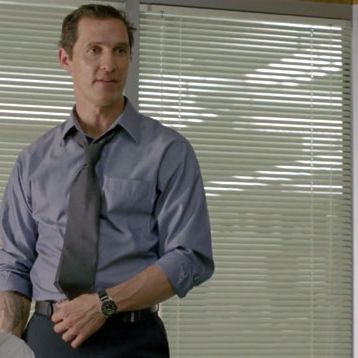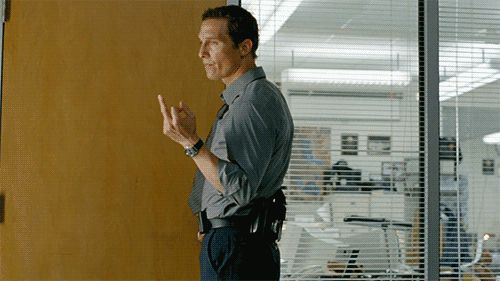
No wonder Rust took off in 2002 and waited several years for the universe to right itself before he returned again. The show has finally revealed just what tore him and Marty apart — not to mention him and Maggie, and Marty and Maggie — and it’s apparent that 2002 was when up became down, black became white, etc. Even though Rust seems to be seeing clearly and speaking plainly, or at least in more illuminating metaphors, his partner and the C.I.D.’s new major (hello, Paul Ben-Victor) still act as if Cohle is sermonizing about humanity’s “secretion of sense and feeling.” Meanwhile, to anyone paying attention, Marty’s circling the drain like the personification of those soiled pants he put in the wash; yet, somehow, his rank remains unchallenged. If one takes Rust’s point of view, this could be purgatory. This could be hell. The only way we know for sure that it’s 2002 are those Segway riders shuttling within yards of Billy Lee Tuttle’s quarters.
Much of the imagery we saw in the episodes largely set in 1995 is also scarce. There aren’t too many spirals or devil’s nests occupying “Haunted Houses,” although those dreamcatchers guarding Terry Guidry’s address remind us that, in Louisiana, symbolism is spirituality. Cohle makes an unauthorized visit to ask Guidry about a son who’d gone missing some time ago; he also drops by the psychiatric institution where Kelly — the surviving girl he and Marty had found enslaved by Reggie Ledoux — now sits, catatonic, in a rocking chair. Cohle pulls meaningful scraps of information from the reluctant interview subjects, notably that Kelly’s worst tormenter had been a scarred man she now IDs as “The Giant.” But like most who encounter Rust, both Kelly and Terry quickly decide that there’s something about his way they don’t like. “Just git, before I do something to you,” warns Terry, echoing the late Dewall Ledoux’s determination that, “I don’t like your face. It makes me want to do things to it.” As for poor Kelly, she just goes wide-eyed and screams.
The one person Rust doesn’t spook is Maggie. In her own 2012 conversation with Detectives Gilbough and Papania, she talks about Cohle as a man of self-assurance, integrity, and responsibility. It makes her sound like a candidate’s wife, or, more precisely, the ex-spouse of a coward cop. Truth is, Maggie admired and wanted to consume Cohle’s trueness and present it in a box to Marty in hopes he’d wither and weep at the sight. But she also included Rust in that category of “crude men who thought they were clever” that she’d wasted so many good years (seventeen to be exact) decrypting. Her Shakespearean seduction of Rust to spite Marty was crueler in effect than intent, which even Maggie seemed to realize once she’d gathered herself in Cohle’s apartment. But this cycle had started long before she walked through Rust’s door in 2002 or raised suspicion at Marty’s telltale slacks swirling in that washing machine. And it will carry on, and Rust, Maggie, and Marty will forever be doomed and connected. That’s what Gilbough and Papania don’t know. That was the gravity keeping Rust in suspended motion and further from finding justice for those women and children. It’s why he fought so hard against its pull, nearly finding oblivion while he waited to safely re-enter their atmosphere.
As much as “Haunted Houses” can be watched through Rust’s perspective, it’s Maggie who wrests this story away from angry or inquisitive men. Her glances call and see through bullshit. She transforms from mother to Medusa when manipulated or misjudged, even if there’s more than a bit of Rust and Marty in how she waylays Gilbough and Papania’s interview with dime store-philosophy digressions. Up till this point, 37-year-old Michelle Monaghan’s relative youth alongside Woody Harrelson was a slight distraction. But in “Houses,” she towers over her muscular co-stars and makes boys of men, unlike Marty, who couldn’t even keep his lunch down after corporally punishing the teen metalheads who had statutorily raped his daughter.
Marty’s already in hell, destined to the futility of pretending he’s a better man, a smarter man — the kind of guy who wears gloves when he decks out kids in a holding cell only to fight his partner bare-knuckled in a parking lot. The kind of guy who leaves more clues than he finds, like the cell phone with naked pictures of Beth, the curvy 20-something T-Mobile staffer (and former resident of the bunny ranch from episode two that Marty had given some pity cash to, causing Cohle to quip, presciently, “Is that a down payment?”) that he’s treating with nary more respect than those dirtbags did Audrey. No wonder Audrey had such a mature impression of sexuality at such a young age. All you had to do in the Hart home was be intuitive and observant, especially when your dad lacks self-awareness and your mom only sees what’s necessary to get by. (At least Marty can spend eternity in damnation with Billy Lee Tuttle, whose cocky sneering when questioned by Cohle makes Maggie look angelic.)
Writer Nic Pizzolatto and director Cary Fukunaga, along with Harrelson, Monagahan and Matthew McConaughey (ditto Tory Kittles and Michael Potts) are in lockstep now, demonstrating what a luxury it can be when stories have a definitive start and finish. True Detective works as television because of how well it functions as a play, where no matter how big the name, everyone’s there to serve a part. And within that interior drama, a handful of messed-up protagonists search for meaning amid constantly circling misdirection. That could just as well be a metaphor for True Detective itself, and with two chapters remaining, the end’s beginning — or the beginning’s end — is unbearably near.

Apart from all that:
Nice Pantera T-shirt.
So can we assume there were devils’ nests in Danny Fontenot’s house back in ’95 because Marie went to the Tuttle school and they were some kind of arts-and-crafts project?
We know that one of Tuttle’s Deacons enjoyed some recreational child porn circa 1988 that Tuttle’s covering up as embezzlement. Lesser of evils, I guess.
I still can’t get over Cohle’s words of advice for baby-murderer Charmaine: “If you get the opportunity, you should kill yourself.”
When Cohle tells Marty, “You eat your fucking young and that’s all just fine as long as you’ve got something to salute,” that seems pretty clear to me.
Are we to presume the Harts were watching The Simple Life over dinner?
That Rusty/Marty throwdown was almost They Live–worthy.
And last but not least, your music footnotes for the week: Very much in the rootsy vein tonight, from Emmylou Harris’s late-nineties cut “The Good Book” and Waylon Jennings’s “Waymore’s Blues” to Father John Misty’s on-the-nose “Every Man Needs a Companion.” But also, speaking of shitty husbands, Ike and Tina’s “Too Many Tears in My Eyes.” And my latest selection that I wish we’d hear in an episode is this. Yours?




